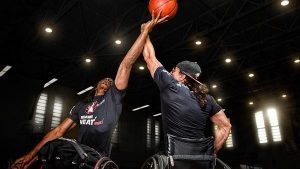Nina Metz covers TV, film and theater for the Chicago Tribune, and has a column called “Chicago Close-Up.” In the article below, she shares her recommendations on films by and about people with disabilities.
 I came across a Facebook post the other day from a guy who uses a wheelchair, talking about attending a rock concert by himself when his plus-one had to bail. Because there was no obvious handicapped seating and “the band is very much about getting people on their feet and moving,” he wrote, “they had removed about three-quarters of the seats from the theater. I took my place in what would become the middle of the mass, with some trepidation.” He wasn’t worried about getting hurt; it was those around him who might get cut by the sharp edges of his chair. Turns out, that wasn’t an issue.
I came across a Facebook post the other day from a guy who uses a wheelchair, talking about attending a rock concert by himself when his plus-one had to bail. Because there was no obvious handicapped seating and “the band is very much about getting people on their feet and moving,” he wrote, “they had removed about three-quarters of the seats from the theater. I took my place in what would become the middle of the mass, with some trepidation.” He wasn’t worried about getting hurt; it was those around him who might get cut by the sharp edges of his chair. Turns out, that wasn’t an issue.
Handicapped seating at venues tends to offer great views, he wrote, but you’re also physically separated from your fellow concertgoers. “Not here though,” he wrote. “Here I got to feel the heat of the bodies pressed against mine, the pungent smells swirling through the air, the unrestrained roar of the crowd.”
It’s not often enough that movies convey these kinds of observations — the small but unique moments and everyday practicalities that people with disabilities experience in the world — but when movies do and they are good, it’s worth taking notice. Here are Metz’s recommendations.
‘The Rebound’
It was over casual conversation at a dog park that documentary filmmaker Shaina Allen met the coach of the Miami Heat wheelchair basketball team and the idea for the film took root. “Murderball” (about wheelchair rugby), from 2005, is the obvious comparison, but Allen’s approach is both more cinematic and less comprehensive.
We get to know only a few members of the team, most notably Mario, who we see at the beginning of the film as he reads from a yellowing newspaper article that recounts the shooting that paralyzed him. “Me thinking I was a bull,” he says remembering his hubris. “Thinking I was untouchable. Thinking I was Superman.”
Mario is wonderfully intense — in his ambitions and the way he needles his fellow teammates: “Whew! Thank the Lord, what a beautiful day!” He’s a bit of a ham. Making an egg scramble for breakfast, he grabs ingredients from the fridge. “It’s all about the broccoli, man,” he says, holding up the stalk and then flexing his biceps. “You better feed the machine, man!” The camera picks up small adjustments he’s made in the kitchen — dishes are stored in the oven below the stove, within easy reach.
I would have liked to see more about the men’s dynamic on the court — their strategies and if there are unique plays that have been developed over the years in the wheelchair league. How many minutes is each player on the court? Did they play basketball before joining the team? There’s also the matter of money. The county used to allocate $30,000 for the program; now it’s down to $2,500. But it costs $11,000 to get to the national tournament, and we never learn how they raised that extra $8,500. It can’t just be car washes, right?
Some of the best moments in the film simply show the guys training and practicing. In the gymnasium, a player will topple over in his chair and then pop himself back up just as fast. To build stamina, they do wind sprints in a multistory parking garage, propelling themselves up the concrete inclines — often pulling their teammates in a train to make it that much harder. (Also distinct from “Murderball,” the men featured here are Latino and African-American.)
The opening credits sequence is especially well-shot, as various players sit before a white backdrop stretching from their wheelchairs to nab a ball in flight or tinkering with the chairs themselves, a striking visual that introduces us to the world of the film.
“Do You Dream in Color?”, a documentary about a diverse group of blind teenagers (the project initially began as a quest to understand the dreams of young blind people and expanded from there), and the drama “My Feral Heart”, starring Steven Brandon, a British actor with Down syndrome playing a young man living independently who, thanks to doubting social workers, is informed he will not be allowed to live on his own.
‘At Eye Level’
As a movie genre, it’s hard to go wrong with instant parenthood. The 2001 German film “Mostly Martha” is one of my favorites — neither sappy nor careless with the sentiment — and “At Eye Level” (also in German with English subtitles) is a similarly low-key but charming slice-of-life. Directors Joachim Dollhopf and Evi Goldbrunner avoid overt emotional manipulations (no insistent score here) to better focus on the subtle but growing trust between an adult who is plainly out of his depth and a child in need of parenting even if it’s from a stranger.
His mother dead, 11-year-old Michi (Luis Vorbach) lives in a group home. He is miserable, despite the comfortable surroundings and caring staff, and forever fending off the taunts of older boys — all of whom are adrift and parentless. Michi’s father? No one knew who he was until Michi finds a forgotten letter his mother wrote — but failed to send — to an old boyfriend, telling him she was pregnant.
Michi follows the address to an apartment where he finds Tom (Jordan Prentice), the man who would be his father. Tom is a little person, and at first Michi doesn’t know what to make of that. Both he and Tom are wary of their newfound family ties, but Michi moves in anyway and their tentative relationship soon deepens and becomes more complicated. “Nothing beats being a dad,” a friend of Tom’s jokes. “You get to pay for everything, hear what you’re doing wrong all the time, how embarrassing you are. Welcome to the club.”
What the directors have done visually is interesting in terms of the details of Tom’s light-filled apartment. The furniture is low to the ground; the kitchen has a raised floor. The dimensions work not only for Tom but for Michi as well. Tom’s height is an everyday matter that on occasion requires some adaptations; that’s shown in the film, but it isn’t exoticized. Banal tasks like riding the bus mean having someone’s rear end in your face. Driving is better; Tom just uses a hand-controlled joy stick to engage the gas and brake.
Nothing in the film would work half as well as it does without Vorbach’s un-self-conscious performance — never cutesy, always true — which is balanced out by Prentice’s steadying presence. There’s a moment when Tom sits in the car watching Michi reluctantly return to the group home. Tom takes a breath, and it catches in his throat. It’s a moment that tells you everything you need to know about how he feels about the kid.

Leave a Reply